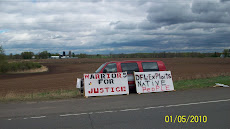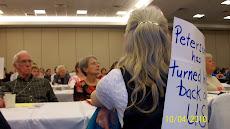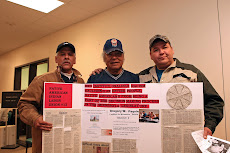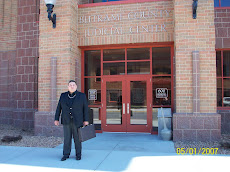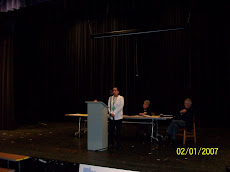The Native American Indian Labor Union #12 finds it of interest that the Plaintiffs have failed to provide--- along with their pleadings--- their employment records designating race and sex of their employees and the unemployment and poverty statistics for the City of Bemidji, Minnesota.
Bemidji has a 25 % Native American Indian population. Are one-quarter of those employed constructing the BREC Native American Indians; if not, why not?
Three large nearby Indian Reservations where people are the victims of poverty resulting from a long-standing, well-established pattern of institutionalized racism in hiring practices that has systematically discriminated against Native American Indians for city, county and state and all other public and private employment.
Not one single Native American Indian is among those serving in the Minnesota State House or Senate which would provide an explanation as to how it could be that these well-educated government officials and private industry management personnel don’t comprehend or understand our concerns that there has been discrimination in the hiring practices concerning the publicly funded construction of the Bemidji Regional Event Center.
It is not by accident that Native American Indians were not given opportunities for employment constructing the BREC.
No considerations of affirmative action hiring policies and guidelines are being considered by these same racist public officials and racist management of VenueWorks, the outside management firm brought in to manage and operate the BREC once it is completed.
http://www.rlnn.com/2009All/ArtNov09/StateCityConstrCoBRECSuitFailsShowHarm.html
State, city, construction company: BREC suit fails to show harm
By Brad Swenson
Bemidji Pioneer
A lawsuit filed against the Bemidji Regional Event Center should be dismissed because it fails to show anyone was harmed by construction hiring practices.
Greg Pacquin, business manager for the Native American Labor Union No. 12 that he formed, filed the lawsuit Oct. 22 in Beltrami County District Court alleging the city of Bemidji didn’t follow affirmative action in hiring workers for the BREC.
Named in the suit are the city, the state Department of Employment and Economic Development which administers the state bonding grant used for construction, and Kraus-Anderson Construction Co., construction manager for the project.
While the city and Kraus-Anderson maintain the Native American Indian Labor Union No. 12 failed to show any individual who was harmed by hiring practices, the state — acting on behalf of DEED — is claiming immunity from lawsuits, saying Pacquin has no standing.
It also states that the state can’t be held liable for the alleged actions of others, namely the city and Kraus-Anderson.
“Defendant DEED is without knowledge or information sufficient to form a belief as to the truth of the allegations,” states the state’s response, written by Assistant Attorney General Kelly Kemp.
The state also denies that it violated any affirmation action laws as cited by Pacquin.
“The complaint fails to state a claim upon which relief can be granted against defendant DEED,” Kemp states, an argument echoed by the other two parties.
“Defendant DEED is entitled to qualified immunity, official immunity, statutory immunity, and/or discretionary immunity.” Kemp writes. “That this action is barred by (state law) which provides that the state and its employees are not liable for any loss caused by an act or omission of a state employee exercising due care in the execution of a valid or invalid statute or rule.”
Kemp asks for the case against the state to be dismissed with prejudice and that the state be awarded court costs.
The suit alleges that the defendants “acted with intent and forethought to engage in racist hiring practices as part of a clear pattern intending to maintain the well established institutionalized racism to deny and deprive native Americans construction employment in the construction of the Bemidji Regional Event Center ,” Paquin said in announcing the lawsuit filing.
BREC “is a public works program funded with taxpayer dollars and publicly backed bonds,” he said, adding that the defendants were “in complete and total disregard for affirmative action guidelines and legislation (that each) were individually and collectively aware of but chose to ignore.”
The city of Bemidji denies each and every allegation in the lawsuit, according to the response filed by James Thomson, attorney for the city from the law firm Kennedy & Graven, retained by the League of Minnesota Cities.
Thomson wrote the city is without knowledge or information to either admit or deny some of the allegations, “to the extent these paragraphs (of the complaint) allege wrongdoing by the city, the city denies plaintiff’s claim.”
The city also denies it violated any affirmative action laws as cited by Pacquin.
“The city denies that plaintiffs are entitled to relief, specifically denying any violation of affirmative action laws and all of plaintiff’s claims for punitive and compensatory damages,” Thomson wrote.
Also, “the complaint fails to state a claim upon which relief can be granted,” he added. “To the extent plaintiffs lack standing with respect to any claim, that claim should be dismissed.”
Pacquin, in his complaint, cites meetings he had with city and construction manager staff to inquire about affirmative action policies, and that the union had forwarded applications from seven of its members for hiring, but none had been hired as the lawsuit was filed. Those individuals are not named in the lawsuit, with the defendants alleging then that no harm has been proven.
Attorneys for Kraus-Anderson also deny all allegations in the complaint.
Kraus-Anderson says it met with Pacquin to discuss affirmative action requirements and that the company’s “representative contacted the city attorney for the city of Bemidji and was told that there were not affirmative action requirements for the project,” J. Scott Andresen of Bassford Remele, attorneys for the company, said in its response.
Kraus-Anderson admits it asked Pacquin to submit names of native American applicants looking for work “and indicated that he would send the list of names to the job site in case any of the contractors for the project were hiring,” Andresen wrote.
Once Kraus-Anderson forwarded the list of names, “Kraus-Anderson had no ability or obligation to require the city (or) any of its contractors to hire anyone from the list of names provided,” states the response.
Stating the construction manager has no knowledge or information of how contractors handled the list, Andresen also writes that the firm “denies that it had any legal obligation to hire a particular class of persons for this project.”
Kraus-Anderson “was only a construction manager for this project pursuant to the terms of an agreement with the city of Bemidji , and that it did not act as the general contractor and therefore did not enter into agreements with the various contractors who worked on the project,” Andresen writes.
Without citing individuals who were harmed, “plaintiffs have not suffered any damages as a result of the alleged conduct,” states the response. It urges the complaint be dismissed with prejudice, and court costs awarded to the company.
The agreement between the city and the state for $20 million in general obligation bonds for the BREC project doesn’t specifically cite affirmative action provisions. Instead, it includes a non-discrimination clause.
“The public entity agrees to not engage in discriminatory employment practices regarding the project, or operation or management of the real property and, if applicable, facility …” it states.